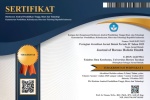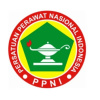Promosi Kesehatan Pada Ibu Hamil dengan Pendekatan Theory Planned Behavior (TPB) : Literatur Review
Abstract
Salah satu pendekatan yang dapat digunakan untuk memahami perilaku kesehatan ibu hamil adalah Theory of Planned Behavior (TPB). Artikel ini bertujuan untuk mengevaluasi efektivitas TPB dalam mempromosikan perilaku kesehatan ibu hamil melalui tinjauan literatur. Metode penelitian yang digunakan adalah tinjauan literatur dengan seleksi artikel dari beberapa database utama seperti PubMed, Scopus, dan Google Scholar. Kriteria inklusi meliputi penelitian yang membahas intervensi kesehatan berbasis TPB pada ibu hamil yang dipublikasikan dalam 10 tahun terakhir. Hasil tinjauan menunjukkan bahwa TPB dapat secara signifikan menjelaskan niat ibu hamil dalam menjalankan perilaku sehat, termasuk nutrisi, aktivitas fisik, pencegahan anemia, dan manajemen depresi. Kontrol perilaku yang dipersepsikan dan niat merupakan prediktor terkuat dari perilaku kesehatan ibu hamil. Namun, terdapat kesenjangan antara niat dan perilaku aktual, yang menunjukkan perlunya strategi tambahan untuk mendukung implementasi perilaku sehat. Dukungan sosial dari keluarga dan tenaga kesehatan serta peningkatan self-efficacy ditemukan penting untuk mengatasi hambatan yang dihadapi ibu hamil dalam merealisasikan niat sehat mereka. Implikasi dari penelitian ini menunjukkan bahwa program berbasis TPB harus memperhatikan faktor-faktor psikologis dan sosial yang dapat mempengaruhi kemampuan ibu hamil untuk menerapkan perilaku sehat secara efektif.
Keywords
Full Text:
PDF (Bahasa Indonesia)References
Al-Barwani, S. (2017). Employing the Theory of Planned Behavior to Predict Breastfeeding Intention and Intensity in Oman. Employing the Theory of Planned Behavior to Predict Breastfeeding Intention & Intensity in Oman.
Armitage, C. J., & Conner, M. (2001). Efficacy of the theory of planned behaviour: A meta-analytic review. British Journal of Social Psychology, 40(4). https://doi.org/10.1348/014466601164939
Bosnjak, M., Ajzen, I., & Schmidt, P. (2020). The theory of planned behavior: Selected recent advances and applications. In Europe’s Journal of Psychology (Vol. 16, Issue 3). https://doi.org/10.5964/ejop.v16i3.3107
Chitsaz, A., Javadi, M., Lin, C. Y., & Pakpour, A. H. (2017). The predictors of healthy eating behavior among pregnant women: An application of the theory of planned behavior. International Journal of Pediatrics, 5(10). https://doi.org/10.22038/ijp.2017.25576.2176
HEALTH, COMMUNICATION, CAPACITY, & COLLABORATIVE. (2021). What is Theory of Planned Behavior? In Health Communication Capacity Collaborative.
Khani Jeihooni, A., Rakhshani, T., Harsini, P. A., & Layeghiasl, M. (2021). Effect of educational program based on theory of planned behavior on promoting nutritional behaviors preventing Anemia in a sample of Iranian pregnant women. BMC Public Health, 21(1). https://doi.org/10.1186/s12889-021-12270-x
Khanjari, G., Rahimi, M., Kalantari, N., Afshar, S., Chaharlang, A., Dehghani, F., Amini, M., & Tarrahi, M. J. (2023). Study of exclusive breastfeeding behaviour based on the theory of planned behaviour in pregnant women in Isfahan in 2021. Family Medicine and Primary Care Review, 25(1). https://doi.org/10.5114/fmpcr.2023.125493
Khayeri, A., Mahmoodi, Z., Rahimzadeh, M., Salehi, L., Moghadam, Z. B., & Saeieh, S. E. (2019). Effect of the theory of planned behavior education on nutritional behaviors of overweight and obese women before pregnancy. International Journal of Women’s Health and Reproduction Sciences, 7(4). https://doi.org/10.15296/ijwhr.2019.78
Kim, H. W., Kim, J., & Kang, S. Y. (2022). Intentions of preventive depression management for a healthy pregnancy by gender among unmarried college students in Korea: a cross-sectional study. Reproductive Health, 19(1). https://doi.org/10.1186/s12978-022-01380-3
Lee, C. F., Chiang, I. C., Hwang, F. M., Chi, L. K., & Lin, H. M. (2016). Using the Theory of Planned Behavior to predict pregnant women’s intention to engage in regular exercise. Midwifery, 42. https://doi.org/10.1016/j.midw.2016.09.014
Malek, L., Umberger, W. J., Makrides, M., & ShaoJia, Z. (2017). Predicting healthy eating intention and adherence to dietary recommendations during pregnancy in Australia using the Theory of Planned Behaviour. Appetite, 116. https://doi.org/10.1016/j.appet.2017.05.028
Mehrabioun, M. (2024). A multi-theoretical view on social media continuance intention: Combining theory of planned behavior, expectation-confirmation model and consumption values. Digital Business, 4(1). https://doi.org/10.1016/j.digbus.2023.100070
Moshi, F. V., Kibusi, S. M., & Fabian, F. (2020). Using the theory of planned behavior to explain birth in health facility intention among expecting couples in a rural setting Rukwa Tanzania: A cross-sectional survey. Reproductive Health, 17(1). https://doi.org/10.1186/s12978-020-0851-1
Sharma, M., Branscum, P. W., & Atri, A. (2014). Introduction to community and public health. In Introduction to community and public health.
Whitaker, K. M., Wilcox, S., Liu, J., Blair, S. N., & Pate, R. R. (2016). Pregnant women’s perceptions of weight gain, physical activity, and nutrition using Theory of Planned Behavior constructs. Journal of Behavioral Medicine, 39(1). https://doi.org/10.1007/s10865-015-9672-z
DOI: https://doi.org/10.35334/borticalth.v7i2.5882
Refbacks
- There are currently no refbacks.









